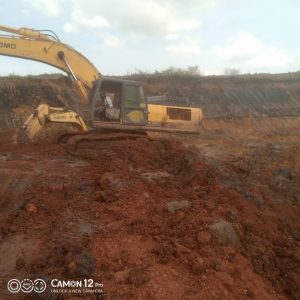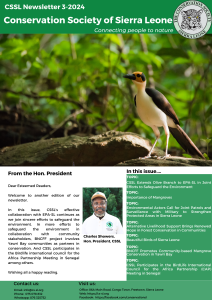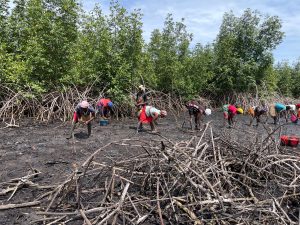In its continued drive to promote conservation work in the Gola landscape, the Conservation Society of Sierra Leone (CSSL), in collaboration with Gola Rainforest Conservation Limited by Guarantee (GRC LG) through funding from Darwin Initiative conducted a second set of roadshow sessions in the project communities in Malema chiefdom, Kailahun district, covering fourteen communities placed in two clusters. The activity spanned from 13th to 15th February 2021, and aimed at increasing the awareness of people in 14 forest edge communities on the benefits of forests and biodiversity conservation.
At the beginning of the session, the project’s Community Development Facilitator, Bobson Kobba stated that, the purpose of the roadshow was to help participants understand the key messages and then convey them to their respective communities.
The CSSL Communications Officer, Abdul K. Dumbuya, took participants through the different components that the roadshows were meant to cover. In the process, he explained how various components were linked to each other, relative to forest conservation and protection. Mr. Dumbuya also informed communities that CSSL and GRC are working collaboratively to promote conservation in the Darwin Initiative supported project communities and the entire Gola landscape in Sierra Leone. He added that, they were conscious about the challenges communities faced relating to conservation and forest protection, which according to him, prompted both institutions to seek funding support from the Darwin Initiative for the implementation of this project in the 14 selected communities. He therefore encouraged everyone to fully support the implementation process by first passing on the messages to those absent during the roadshows.
Mariama Kargbo, the CSSL Environmental Education Officer, explained the importance and role of women in land-use planning and co-management. She encouraged women to actively participate in decision-making processes relative to co-management and land-use planning. She emphasized that such involvement was required to ensure gender sensitivity in the sustainability of the forest management. Mariama later led a session in helping participants outline key challenges that women face in forest conservation and community resources mobilization. At the end of the discussion, participants acknowledged that men should give priority to or support women to strategically position themselves in communities and increase their forest conservation efforts.
Community women expressed appreciation for recognizing their efforts in forest conservation. According to them, they had indeed realized the importance of their role if forest conservation should be successful. Madam Iye Fomba, the Chairlady of Mayengema community said, quality water alone could be one of the benefits that they enjoy from their forest. “We should conserve the forest; we should avoid any human activity that tend to destroy or reduce the quality of the forest”, she pleaded with her community folks. Participants however appealed for timely support to boost their agriculture or livelihood activities.
School Nature Club (SNC) children also provided immense contribution to the activity. They helped deliver specific predetermined messages through drama. Such messages which included forest conservation and the need for community forestry, were delivered in both English and the predominant local dialect, Mende for proper understanding of communities.



